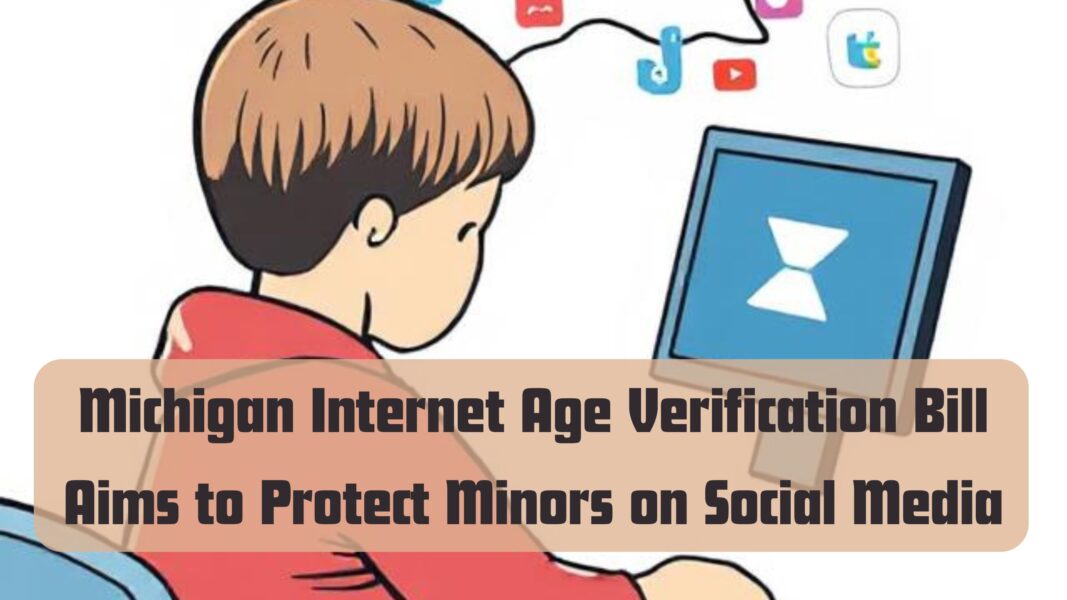Michigan lawmakers are considering a series of Michigan internet age verification bills aimed at protecting minors online, extending policies that have already appeared in Louisiana, Texas, Florida, and Utah.

The legislation, introduced by Sen. Thomas Albert (R-Lowell), would require commercial websites and social media platforms to verify the ages of their account holders. Children under 18 would need parental consent to open accounts, and parents would gain authority over account supervision, including time limits and privacy settings.
How Michigan Internet Age Verification Would Work
Internet service providers (ISPs) and platforms would need to confirm user ages through “reasonable” methods, such as uploading government-issued IDs. Violations could result in fines for the providers. Importantly, websites would be prohibited from storing user data once age verification is completed.
A related proposal would allow parental supervision of minors under 16 on social media platforms, giving parents more control over content, privacy, and online engagement.
Also Read: Legal Risks of Web Trackers Violating Privacy Laws Before Internet
Privacy and Free Speech Concerns
Privacy advocates and free speech organizations, including the American Civil Liberties Union (ACLU) and Electronic Frontier Foundation (EFF), have raised concerns.
The ACLU warns that age verification mandates could inadvertently censor non-explicit speech, affecting platforms like Reddit, streaming services with R-rated content, and websites addressing sexual health. The EFF cautions that verification systems could collect excessive data, posing risks for misuse despite safeguards.
Current Age Verification Practices in Social Media and Search Engines
Even before legislation passes, some platforms already verify users’ ages. Meta (Facebook and Instagram) asks users to upload official documents such as driver’s licenses or passports for identity and age confirmation.
Similarly, X (formerly Twitter) uses age assurance systems to comply with international regulations, including the UK’s Online Safety Act and the EU Digital Services Act. Google and YouTube also operate verification mechanisms and SafeSearch filters, which automatically block explicit content for users under 18.
Next Steps for Michigan Internet Age Verification
Sen. Albert’s bills are currently pending in the Senate Regulatory Affairs Committee. If passed, Michigan could join a growing number of states that mandate internet age verification, giving parents more oversight while sparking debates on privacy, data protection, and freedom of expression.
Also Read: UK Online Safety Law: Ofcom Publishes First Official Guidelines
FAQs: Michigan Internet Age Verification
1. What is Michigan internet age verification?
It is legislation requiring websites and social media platforms to verify the age of users, ensuring children under 18 have parental consent.
2. Who introduced the bill?
Sen. Thomas Albert (R-Lowell) introduced the proposal.
3. How would age verification work?
Users may need to upload government-issued IDs, and platforms cannot store data after verification.
4. Which age group is affected?
Children under 18, with specific supervision rules for those under 16 on social media.
5. What are parental controls under this bill?
Parents could supervise account settings, privacy, and screen time for their children.
6. What privacy concerns exist?
Organizations like the EFF warn that age verification could lead to data misuse or excessive collection.
7. What free speech concerns exist?
The ACLU cautions that laws could inadvertently censor non-obscene content on social media and websites.
8. Which companies already implement age verification?
Meta, X, Google, and YouTube have systems for verifying user age and identity.
9. What happens if providers violate the rules?
ISPs and platforms could face fines for non-compliance.
10. When will Michigan internet age verification take effect?
The bills are still pending committee review and have not yet passed into law.

